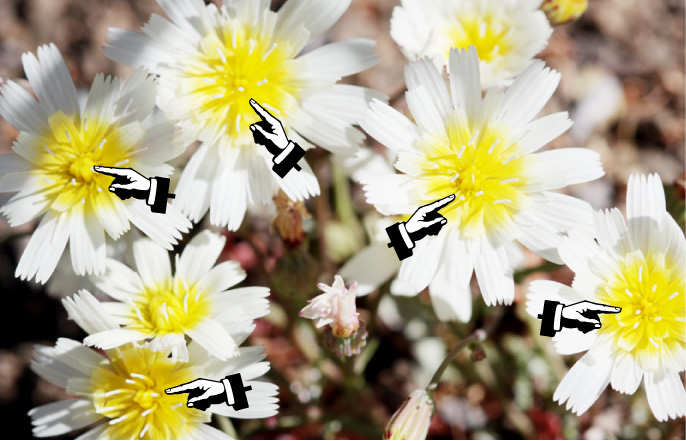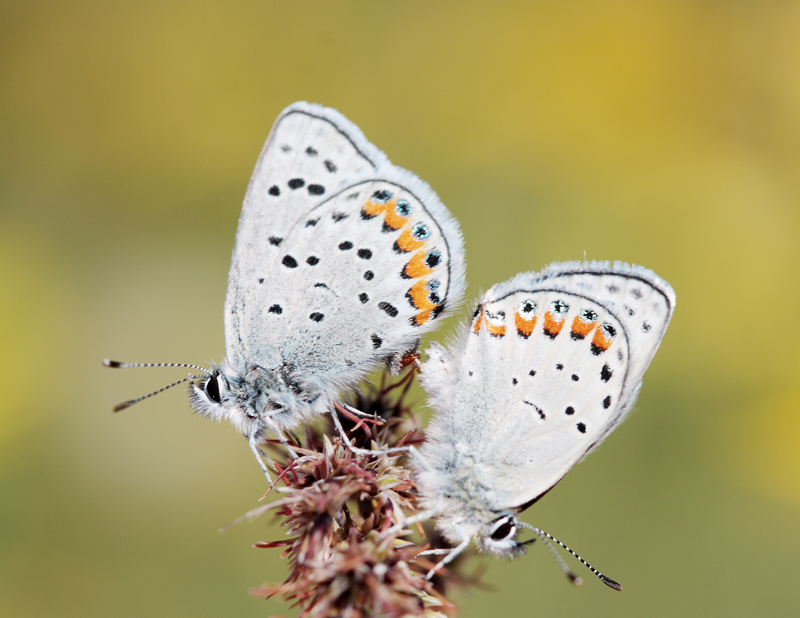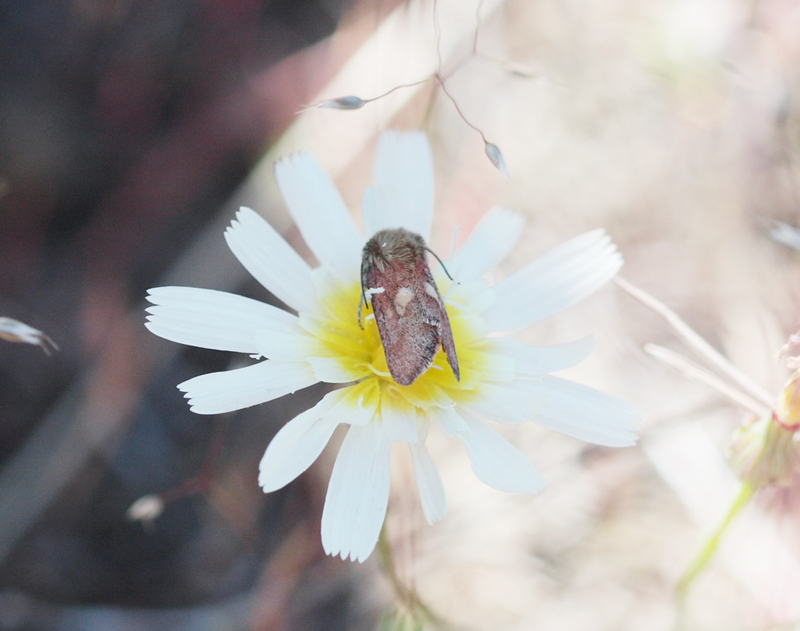За последните четири уикенда сега съм бил на зелен хайвер, за един молец, Speedy Heliolonche. Това е една красива малка Noctuidae с розови forewings и зашеметяващи оранжево-червени hindwings. Това не е много често срещани и се срещат само по северните планински масиви на Калифорния, хранещи се с малакотрикс флоцифери – а CA ендемична цвете. Всяко пътуване аз придобих skunked, до днес – I събира двама! Както може би си спомняте първия ми излет беше преди около месец, не молец, но красива серия от проби и фотографии на Адела молци. В последните няколко пътувания дори не са идвали близо да бъде толкова продуктивни, колкото този, Адела. И така, какво да правя, когато не намери целта си? Вземете слънчево изгаряне и се вземат някои кофти снимки.
(продължи по-долу)
Не съвсем молец.
 Без молец, не молец, не молец…
Без молец, не молец, не молец…
ЕДНА МОЛЕЦ!
Това Х. целина проявява типично поведение на цветния молец, седнал върху главата на цветето, обикновен като ден. Те всъщност стоят така цяла нощ на цветето (дори и да се затваря около тях, както правят някои цветя – което води до разговорно да бъдат известни като “тако молци”… защото дупето на молеца стърчи покрай венчелистчетата и изглежда като в тако). И точно заради това напуснах апартамента си в 6 съм тази сутрин, за да пристигна 8. Ако навън все още е студено, те дори не потрепват, когато се приближите. И, ако не летят, лесно е да проучите зона за молци и да знаете, че не сте пропуснали нито една. Но, щом слънцето ги загрее, те се превръщат в бързи копелета и изчезват, преди дори да успеете да посегнете към капачката на обектива. Това е първият молец, който видях днес, аз наистина не положих усилия да направя страхотно изображение. Субектите имат лошия навик да отлитат веднага след като получите добрия кадър (добре, обикновено точно преди добрия изстрел)… и не можех да рискувам да загубя единствения екземпляр за деня.




Where’s the “like” button? Great pics and good commentary.
“Без молец, не молец, no moth…”
Ha. I lol’d.
It is a pretty little thing…
A colorful, day-flying moth that sits prominently in the center of flowers – chemical defenses?
Това е добър въпрос, and it has crossed my mind before. There a lot of these small day flying flower moths that are clearly not cryptic yet I haven’t ever read about any chemical defenses or mimicry. I also don’t think of Malacothrix as a particularly noxious plant… will investigate.
добре, now I have to post the latest mystery moth pics I took a few days ago. (4/30) Pretty please if you have a moment, check it out and render your sage opinion. !
Ted’s question has nagged me this week. I’ve never heard of anyone studying this, но… Has anyone seen these flower moths under UV? See a related flower species under UV here: http://www.naturfotograf.com/UV_SENE_AQU.html. Може би, while sitting on the bulls-eye, these moths become “invisible” to predators who see UV, such a birds. The added bonus for the moths is this might increase their chances of finding a mate which is attracted to the UV bulls-eye.
You have to be right about that Katie, I’ve been thinking about this too. I can’t recall any literature in reference to adult insect UV crypsis. There is some work in regards to caterpillars… but I’ll have to do some more digging. Birds are probably not the primary predator on these moths since their acute vision makes them incredibly difficult to approach in the daytime. Но, most lizards see in UV and these flowers are just about at head level for most small reptiles (and there were a ton on site).
Sometimes, the light bulb just turns on.
So there is a monograph to this subfamily – and in there Hardwick (author) points out the counterintuitive crypsis of this moth! Instead of a good idea he postulates
Така, he just assumes they are oddities because the flowers changed without them and they survived “possibly because of a decrease in predation pressure”.
Seems to me that UV crypsis is much more likely. И… I don’t believe that’s been shown in adult Lepidoptera. Add it to the list!
; ) Just make sure you credit me for this idea when you become the ruler of the universe, е… recognized expert on lepidopteran UV crypsis. I’m glad you looked it up. Please let me know if you find out any more info.